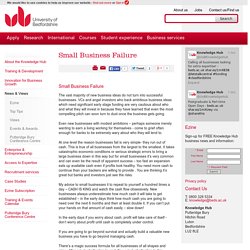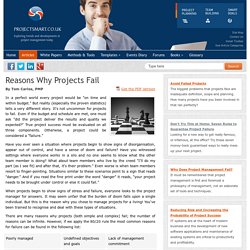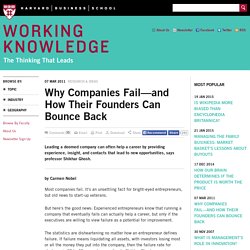

Project-failure.gif (GIF Image, 640 × 287 pixels)
Zusammenschlüsse: Wie sich das Scheitern von Fusionen verhindern lässt - Seite 3. Ein Drittel aller Fusionen vom Typ "Poker" Ein knappes Drittel aller Fusionen gehört zum Typ „Poker“: Mit drei überdurchschnittlich hoch belasteten Risiko-Bereichen gelingt die Integration nur noch in 17 Prozent aller Fälle.

Für Gerds typisch in dieser Kategorie ist der misslungene BMW-Rover-Deal von 1994. Fast sechs Milliarden Euro wurden in den Sand gesetzt, 2000 stießen die Bayern die britische Tochter wieder ab. „Das Scheitern war absehbar“, urteilt der Berater. Hohe Struktur-Risiken gab es etwa bei den völlig unterschiedlichen Geschäftsprozessen: Die Qualitätsstandards passten nicht zusammen, auch der Beschluss, die Rover-Modellpalette vollständig zu erhalten, statt sie auf Klein- und Geländewagen zu beschränken, erhöhte das Risiko. Felix Maria Arnet Experte für persönliches Wachstum. 2 Gründe warum Existenzgründungen scheitern und Tipps > Existenzgründung, Selbständig. 2 Gründe warum Existenzgründungen scheitern und Tipps > Existenzgründung, Selbständig > Selbständig im Netz. 7 Fehler, warum Existenzgründer schnell wieder scheitern - und wie Sie sie vermeiden. Gehen Unternehmen Pleite, weil Kunden nicht zahlen, die Kaufkraft schwindet oder die Abgabenlast zu hoch ist?

Aber durch richtiges unternehmerisches Handeln können Sie Krisen vorbeugen. Lesen Sie in diesem Beitrag aus dem Handbuch für Selbstständige und Unternehmer, wie Sie Ihr wirtschaftliches Überleben sichern. Was Untersuchungen ergeben haben und wie die Praxis aussieht Die Organisation Creditreform e.V. untersucht regelmäßig die Insolvenzentwicklung in Deutschland. Ten Common Causes of Business Failure. Ten Common Causes of Business Failure. Causes of Business Failure. Small Business Failure - beds.ac.uk. Small Business Failure The vast majority of new business ideas do not turn into successful businesses.

VCs and angel investors who back ambitious business ideas which need significant early stage funding are very cautious about who and what they will invest in because they have learned that even the most compelling pitch can soon turn to dust once the business gets going. Even new businesses with modest ambitions – perhaps someone merely wanting to earn a living working for themselves - come to grief often enough for banks to be extremely wary about who they will lend to.
At one level the reason businesses fail is very simple- they run out of cash. This is true of all businesses from the largest to the smallest. My advice to small businesses it to repeat to yourself a hundred times a day – CASH IS KING and watch the cash flow obsessively. In the early days if you worry about cash, profit will take care of itself - don’t worry about profit until cash is completely under control. Small Business Failure - beds.ac.uk. Business failure. Joe's was one of the businesses to fail in 2009.

Advertisement for "Quitting Business" sale in Los Angeles, California, newspaper, 1909 Reasons[edit] Businesses can fail as a result of wars, recessions, high taxation, high interest rates, excessive regulations, poor management decisions, insufficient marketing, inability to compete with other similar businesses, or a lack of interest from the public in the business's offerings. 7 Causes of Business Failure. By Moe NawazGoogle +18 20 17 9 With over two decades of experience (published author with a number of publications on Amazon) working alongside entrepreneurs and leaders with ailing and under-performing businesses to help them to turnaround and grow, I have learnt more than what I chipped in for these companies.

Strategies for Learning from Failure. The wisdom of learning from failure is incontrovertible.

Yet organizations that do it well are extraordinarily rare. This gap is not due to a lack of commitment to learning. Managers in the vast majority of enterprises that I have studied over the past 20 years—pharmaceutical, financial services, product design, telecommunications, and construction companies; hospitals; and NASA’s space shuttle program, among others—genuinely wanted to help their organizations learn from failures to improve future performance. In some cases they and their teams had devoted many hours to after-action reviews, postmortems, and the like.
But time after time I saw that these painstaking efforts led to no real change. Reasons Why Projects Fail. In a perfect world every project would be "on time and within budget.

" But reality (especially the proven statistics) tells a very different story. It's not uncommon for projects to fail. Even if the budget and schedule are met, one must ask "did the project deliver the results and quality we expected? " True project success must be evaluated on all three components. Otherwise, a project could be considered a "failure.
" Have you ever seen a situation where projects begin to show signs of disorganisation, appear out of control, and have a sense of doom and failure? When projects begin to show signs of stress and failure, everyone looks to the project manager for answers. There are many reasons why projects (both simple and complex) fail; the number of reasons can be infinite. Even with the best of intentions or solid plans, project can go awry if they are not managed properly. Tom Carlos has over 20 years of cumulative experience in business, technical, and training environments. And How Their Founders Can Bounce Back. Most companies fail.

It's an unsettling fact for bright-eyed entrepreneurs, but old news to start-up veterans. But here's the good news: Experienced entrepreneurs know that running a company that eventually fails can actually help a career, but only if the executives are willing to view failure as a potential for improvement. The statistics are disheartening no matter how an entrepreneur defines failure. If failure means liquidating all assets, with investors losing most or all the money they put into the company, then the failure rate for start-ups is 30 to 40 percent, according to Shikhar Ghosh, a senior lecturer at Harvard Business School who has held top executive positions at some eight technology-based start-ups.